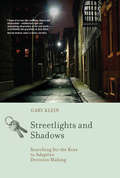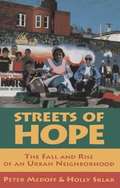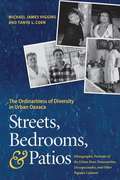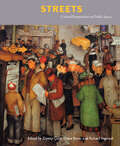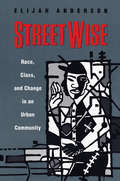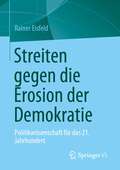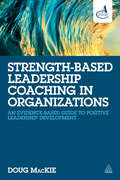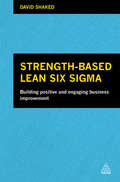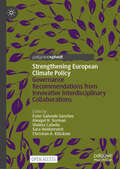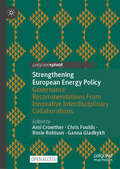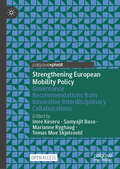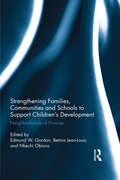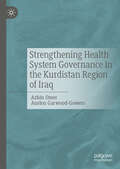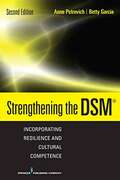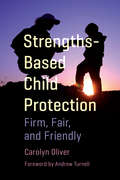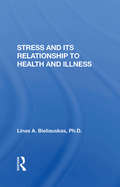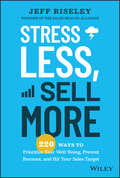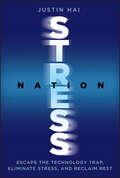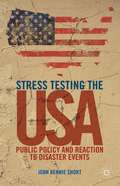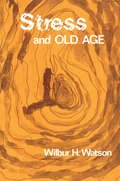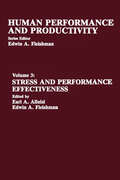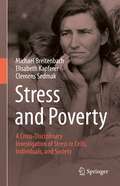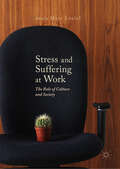- Table View
- List View
Streetlights and Shadows: Searching for the Keys to Adaptive Decision Making
by Gary A. KleinAn expert explains how the conventional wisdom about decision making can get us into trouble—and why experience can't be replaced by rules, procedures, or analytical methods.In making decisions, when should we go with our gut and when should we try to analyze every option? When should we use our intuition and when should we rely on logic and statistics? Most of us would probably agree that for important decisions, we should follow certain guidelines—gather as much information as possible, compare the options, pin down the goals before getting started. But in practice we make some of our best decisions by adapting to circumstances rather than blindly following procedures. In Streetlights and Shadows, Gary Klein debunks the conventional wisdom about how to make decisions. He takes ten commonly accepted claims about decision making and shows that they are better suited for the laboratory than for life. The standard advice works well when everything is clear, but the tough decisions involve shadowy conditions of complexity and ambiguity. Gathering masses of information, for example, works if the information is accurate and complete—but that doesn't often happen in the real world. (Think about the careful risk calculations that led to the downfall of the Wall Street investment houses.) Klein offers more realistic ideas about how to make decisions in real-life settings. He provides many examples—ranging from airline pilots and weather forecasters to sports announcers and Captain Jack Aubrey in Patrick O'Brian's Master and Commander novels—to make his point. All these decision makers saw things that others didn't. They used their expertise to pick up cues and to discern patterns and trends. We can make better decisions, Klein tells us, if we are prepared for complexity and ambiguity and if we will stop expecting the data to tell us everything.
Streets of Hope: The Fall and Rise of an Urban Neighborhood
by Holly Sklar Peter MedoffLong Boston's most impoverished area, the Dudley Street neighborhood is living an extraordinary story of community rebirth shaped by the dreams of ordinary people of different races and generations. This inner city neighborhood, like so many around the country, was treated like an outsider city--separate, unequal and disposable.
Streets, Bedrooms, and Patios
by Michael James HigginsDiversity characterises the people of Oaxaca, Mexico. Within this city of half a million, residents are rising against traditional barriers of race and class, defining new gender roles, and expanding access for the disabled. In this rich ethnography of the city, Michael Higgins and Tanya Coen explore how these activities fit into the ordinary daily lives of the people of Oaxaca. Higgins and Coen focus their attention on groups that are often marginalised - the urban poor, transvestite and female prostitutes,discapacitados(the physically challenged), gays and lesbians, and artists and intellectuals. Blending portraits of and comments by group members with their own ethnographic observations, the authors reveal how such issues as racism, sexism, sexuality, spirituality, and class struggle play out in the people's daily lives and in grassroots political activism. By doing so, they translate the abstract concepts of social action and identity formation into the actual lived experiences of real people. Michael James Higgins is Professor of Anthropology at the University of Northern Colorado. Tanya L. Coen is Co-Director of Zocalero Creative Cultural Productions in San Francisco. Together they also wrote¡Oigame! ¡Oigame!: Struggle and Social Change in a Nicaraguan Urban Community.
Streets: Critical Perspectives on Public Space
by Diane Favro Richard Ingersoll Zeynep ÇelikThis collection of twenty-one essays, written by colleagues and former students of the architectural historian Spiro Kostof (1936-1991), presents case studies on Kostof's model of urban forms and fabrics. The essays are remarkably diverse: the range includes pre-Columbian Inca settlements, fourteenth-century Cairo, nineteenth-century New Orleans, and twentieth-century Tokyo. Focusing on individual streets around the world and from different historical periods, the collection is an inviting overview of the street as an urban institution.The theme of the volume is that the street presents itself as the basic structuring device of a city's form and also as the locus of its civilization. Each essay is a detailed investigation of a single urban street with unique historical conditions. The authors' shared concern regarding anthropological, political, and technical aspects of street making coalesce into a critical discourse on urban space. A fitting tribute to Spiro Kostof, this collection will be greatly admired by scholars and general readers alike.
Streetwise: Race, Class and Change in an Urban Community
by Elijah AndersonEthnography contrasting two adjacent communities: one is a ghetto and the other is being rapidly gentrified.
Streik im Wandel (essentials)
by Irene RaehlmannIm Zentrum des essentials stehen die aktuellen Streiks von 2014/15, die in verschiedenen Branchen des Dienstleistungssektors stattgefunden haben, so bei der Bahn, der Lufthansa, der Post und den Kitas. Die Autorin verdeutlicht in ihrer Schrift den pr#65533;gnanten Unterschied dieser Streiks zu denjenigen in der Industrie. Bei Ersteren ist nicht nur das bestreikte Unternehmen betroffen, sondern unmittelbar die Gesellschaft insgesamt und vor allem die B#65533;rgerInnen: Sie m#65533;ssen den in Unordnung geratenen Alltag neu ordnen, was besonders f#65533;r Erwerbst#65533;tige eine enorme Herausforderung bedeutet.
Streiten gegen die Erosion der Demokratie: Politikwissenschaft für das 21. Jahrhundert
by Rainer EisfeldEuropaweit und darüber hinaus unterliegen Demokratien alarmierender Aushöhlung. Rapider wirtschaftlicher, kultureller, politischer Wandel weckt Unsicherheiten und Aggressionen; Politiker, Parteien, selbst Regierungen versuchen Bürger durch systematische Lügen zu täuschen; neoliberale Deregulierungen schwächen die Bereitschaft zum zivilgesellschaftlichen Engagement; schroffe Einkommens- und Vermögensunterschiede treiben die Demokratie in Richtung Plutokratie; fremdenfeindliche Vorurteile polarisieren Gesellschaften; Antiterrorismus-Strategien untergraben bürgerliche Freiheiten; Vetospieler hemmen klimapolitischen Wandel. Zugleich wird seit Jahren gestritten über die Fragmentierung der Politikwissenschaft, ihre zweifelhafte Relevanz und ihre Abkopplung von der breiten Öffentlichkeit. Dieses Buch ist die erste umfassende Studie, die beide Fragenkomplexe miteinander verknüpft und präzise zu ergründen sucht: Wie kann, wie sollte die Politikwissenschaft dem Niedergang der Demokratie in jedem der erwähnten Bereiche entgegenwirken?Rainer Eisfelds Antworten lauten: Entwicklung einer Wissenschaftskultur öffentlichen Engagements; Auseinandersetzung mit Ursprüngen, Mustern und partizipativer Bewältigung durchgängigen Wandels als Hauptgegenstand der Disziplin; kategorisches Auftreten gegen Tendenzen zu einer Herrschaft notorischer Lügner; Konzentrierung der Forschungsprioritäten auf die Schlüsselbereiche, in denen Demokratie sich zurückbildet; für Laien zugängliche Darstellung gewonnener Resultate; Erweiterung der Analyse zur Präsentation konkreter Gestaltungsvorschläge.Dazu, so Eisfelds Fazit, bedarf es einer Disziplin, die als normativ orientierte, empirisch gestützte Demokratiewissenschaft brisanten Problemen den Vorrang einräumt vor ausgefeilten Methoden und bürgernaher Relevanz vor immer weiterer Spezialisierung.
Strength-Based Leadership Coaching in Organizations
by Doug MackiePositive organizational psychology, with its focus on the identification and development of strengths, is a natural ally to executive development and leadership coaching. However, this approach is only just beginning to come to the attention of organizations and consequently, the research base for strength-based coaching is in its early stages of development. Strength-based Leadership Coaching in Organizations reviews strength-based approaches to positive leadership development and evaluates the evidence for their effectiveness, critically assesses their apparent distinctiveness and considers how strengths can be reliably assessed and developed in their organizational context. Strength-based Leadership Coaching in Organizations reviews key areas of leader and team development and describes a model of strengths development in organizations. It discusses the application of strength-based leadership coaching from the managerial and external perspective within the context of career stage, seniority, role challenges and organizational need in order to facilitate meaningful change. Finally, it covers the limitations of the strength-based approach to leadership development together with the challenges of integrating positive leadership development. It shows exactly what a strengths focus is and that there is increasing evidence that this approach does get results. Where other books focus on one model of identifying strengths, this book offers a balanced and critical examination, showing how to apply a positive strength-based approach.
Strength-Based Lean Six Sigma
by David ShakedStrength-based Lean Six Sigma is a new way of approaching process improvement that combines the best practices of two established methodologies to generate a new approach in order to help you develop and deliver increased high performance in any organization. It is the first book to use approaches in business improvement as well as organizational change for optimum organizational performance and improved agility.Combining the energy and motivation released through a strengths-based approach with the focus on quality and efficiency generated by lean six sigma, it offers practitioners from all disciplines the opportunity to understand each other and work successfully together to drive effective and powerful change programmes.
Strength-Based Lean Six Sigma: Building Positive and Engaging Business Improvement
by David ShakedStrength-based Lean Six Sigma is a new way of approaching process improvement that combines the best practices of two established methodologies to generate a new approach in order to help you develop and deliver increased high performance in any organization. It is the first book to use approaches in business improvement as well as organizational change for optimum organizational performance and improved agility. Combining the energy and motivation released through a strengths-based approach with the focus on quality and efficiency generated by lean six sigma, it offers practitioners from all disciplines the opportunity to understand each other and work successfully together to drive effective and powerful change programmes.
Strengthening European Climate Policy: Governance Recommendations from Innovative Interdisciplinary Collaborations
by Christian A. Klöckner Ester Galende Sánchez Alevgul H. Sorman Violeta Cabello Sara HeidenreichThis open-access book foregrounds 10 novel collaborations between the Social Sciences and Humanities (SSH), and Science, Technology, Engineering and Mathematics (STEM) disciplines, for strengthening European climate policy. Part of a three-volume collection covering climate, energy, and mobility policy.
Strengthening European Energy Policy: Governance Recommendations From Innovative Interdisciplinary Collaborations
by Chris Foulds Rosie Robison Ami Crowther Ganna GladkykhThis open access book foregrounds novel collaborations between the Social Sciences and Humanities (SSH), and Science, Technology, Engineering and Mathematics (STEM) disciplines, for the benefit of European energy policy. Each chapter has been led by a team spanning social and technical disciplines. The book proposes 10 policy recommendations to: Simplify the uptake of community energy; Prioritise societal engagement in geothermal; Create co-learning for energy communities; Facilitate energy literacy; Support place-based strategies for retrofit; Promote integrated policy design for agrivoltaics; Increase social acceptability of low-carbon technologies; Protect digital energy infrastructure; Understand stakeholder perceptions of energy-efficiency measures; and Rethink energy system models to support the just transition. It will be of interest to anyone developing, implementing or critiquing energy policy (locally, nationally or internationally) as well as those looking to expand the use of interdisciplinary research to achieve sustainability goals. Part of a three-volume collection covering climate, energy, and mobility policy.
Strengthening European Mobility Policy: Governance Recommendations from Innovative Interdisciplinary Collaborations
by Marianne Ryghaug Tomas Moe Skjølsvold Imre Keseru Samyajit BasuThis open access book showcases innovative collaborations between the Social Sciences and Humanities (SSH) and Science, Technology, Engineering, and Mathematics (STEM) disciplines to benefit European mobility policy. Each chapter has been researched by a team encompassing both social and technical expertise. The book presents nine policy recommendations aimed at enhancing mobility and logistics. It will interest anyone involved in researching, developing, implementing, or evaluating mobility and logistics policy at local, national, or international levels. It is also valuable for those seeking to expand the use of interdisciplinary research to achieve sustainability goals. Part of a three-volume collection covering climate, energy, and mobility policy.
Strengthening Families, Communities, and Schools to Support Children's Development: Neighborhoods of Promise
by Edmund W. Gordon Betina Jean-Louis Nkechi ObioraDrawing on a range of contexts influenced by the Promise Neighborhoods Program—a federal place-based initiative to improve educational outcomes for students in distressed urban and rural neighborhoods—this book outlines effective characteristics and elements for implementing supplementary education. Chapter authors demonstrate that the disparities in educational achievement between white and non-white students can only be addressed by a holistic approach that takes the communities in which schools are situated as its focal point. This edited collection distills the insights gained from the communities implementing such comprehensive education programs and provides the framework and models for reproducing such successes.
Strengthening Health System Governance in the Kurdistan Region of Iraq
by Austen Garwood-Gowers Azhin OmerThis book is a nuanced study of healthcare provision and health systems governance in the Kurdistan Region in Iraq (KRI). The authors address an important knowledge gap, offering compelling insights into health systems and governance in Kurdistan before and after the start of the Covid-19 pandemic. The findings stem from a system of benchmarking derived from both a comparative analysis of international healthcare standards and original empirical research. In light of the benchmarks of best practices for health system governance and the findings from in-depth qualitative interviews, the authors critically discuss the strengths and weaknesses in KRI healthcare governance and put forward pathways for reform. This thought-provoking book contributes to an important area of research on contemporary health systems governance and healthcare provision in low-income countries and war-affected regions.
Strengthening The Dsm: Incorporating Resilience And Cultural Competence
by Anne Petrovich Betty GarciaMental health practitioners have long recognized the failure of the DSM to address important sources of strength and resiliency that can significantly affect diagnosis and treatment, a deficit that has become more pronounced with the DSM-5’s elimination of the multiaxial format. The second edition of Strengthening the DSM® presents a new conceptual framework—the Diversity/Resiliency Formulation— that encompasses the whole person in order to promote effective diagnosis and treatment. It considers patient strengths, sources of resilience, support, and cultural identity that are essential to the accurate understanding of an individual, and demonstrates how mental health practitioners can draw upon these resources during treatment. The second edition also addresses significant changes resulting from implementation of the Affordable Care Act (ACA) and features a completely new chapter on trauma and stressor-related disorders.
Strengths-Based Child Protection: Firm, Fair, and Friendly
by Carolyn OliverStrengths-based, solution-focused practice is one of the most exciting areas of contemporary child protection work. The demand for this protection practice has increased faster than the availability of training resources to help students and practitioners, until now. Strengths-Based Child Protection is the first textbook solely dedicated to furthering strengths-based practices in a child protection setting. Carolyn Oliver provides an original, accessible, and practical research-based model that focuses on the key to success in this field: the worker-client relationship. Oliver’s long and varied front line experience in child welfare and research based on surveys and interviews with 225 child protection workers provides grounding in the realities of child protection work. Strengths-Based Child Protection contains a rich combination of case studies, reflective questions, and exercises that enable students and practitioners to conceptualize and master implementing strengths-based practices with children.
Stress And Its Relationship To Health And Illness
by Linas A BieliauskasTo discuss the relationship between stress and health status, it is first necessary to define the term "stress." This is not a mundane issue, because the term "stress" is popularly used to refer to a wide range of physiological changes, psychological states, and environmental pressures in the health/illness literature. Stress was first described as a biological syndrome by Selye (1936, p. 32): Experiments on rats show that if the organism is severely damaged by acute non-specific nocuous agents such as exposure to cold, surgical injury, production of spinal shock ... a typical syndrome appears, the symptoms of which are independent of the nature of the damaging agent ... and represent rather a response to damage as such.
Stress Less, Sell More: 220 Ways to Prioritize Your Well-Being, Prevent Burnout, and Hit Your Sales Target
by Jeff RiseleyImprove your sales performance and avoid burnout with Mental Health, resilience, and stress-management strategies. In Stress Less, Sell More: 220 Strategies to Prevent Sales Burnout and Maximize Mental Performance, celebrated sales leader and founder of the Sales Health Alliance, Jeff Riseley, delivers a practical and impactful handbook that makes it easy for sales teams to perform better and build mental health conversations consistently into their busy selling days. In the book, you’ll explore ways to navigate the pressures and stressors faced by every sales professional. Its pages can be read day-by-day or all at once, and a companion website supplements the material found in the book with free articles, , and videos. You’ll also discover: How to build an individual Mental Health and stress-management toolkit to improve mental resilience and sales performance. Ways to overcome stressors in sales like lost deals, missed targets and buyers ghosting. Helpful team-based changes that dramatically improve salesperson mental health—like quota relief during vacationsAn essential guide to improving salesperson wellbeing and sales performance, Stress Less, Sell More will prove to be an invaluable resource for sales leaders, team leaders, salespeople, and sales teams looking for ways to make daily work life less stressful and more productive.
Stress Nation: Escape the Technology Trap, Eliminate Stress, and Reclaim Rest
by Justin HaiA provocative deep dive into how technology is wrecking our hormones and our health—and the powerful tools you need to reclaim your well-being and thrive. Stress Nation provides answers to the lingering questions many people have about why they constantly feel tired, lonely, anxious, disconnected, and unwell, explaining in both humorous and poignant prose how the technology that was supposed to make our lives easier is actually one of the leading causes of chronic stress, dysregulated cortisol, and dangerously inadequate sleep. Equal parts commentary and practical guide, this book offers solutions that empower readers to manage their stress, improve their sleep, and implement scientifically supported methods to break the cycle of device addiction. In this book, readers will discover: How cortisol—the Master Hormone and your body's overworked alarm system—can become dangerously imbalanced, ruin your health, and leave you feeling exhausted and overwhelmed. How Silicon Valley went for your attention instead of your well-being – and how that's warped the way we sleep, date, parent, and even think. Practical, empowering ways to unplug, reconnect, and start living like a human again – not a device-controlled zombie. Stress Nation is both your wake-up call and game plan that delivers on its promise of a clearer mind, healthier body, and better life.
Stress Testing the USA
by John Rennie ShortIn this volume, the USA is treated as a system that has been stress-tested by four unique events: the War on Terror, Hurricane Katrina, the Financial Meltdown that led to the Great Recession and the Giant Oil Spill. The author uses stress-testing to identify weaknesses within the "system," and examine the response to disaster.
Stress and Old Age
by Wilbur WatsonFirst Published in 2017. Routledge is an imprint of Taylor & Francis, an Informa company.
Stress and Performance Effectiveness: Volume 3
by Earl A. Alluisi and Edwin A. FleishmanFirst published in 1982. Routledge is an imprint of Taylor & Francis, an informa company.
Stress and Poverty: A Cross-Disciplinary Investigation of Stress in Cells, Individuals, and Society
by Clemens Sedmak Michael Breitenbach Elisabeth KapfererThe word stress is everywhere and highly overused. Everyone is stressed, it seems, all the time. Looking into the meaning of stress in the natural science and the humanities, this book explores cellular stress as cause of and in correlation with what humans experience as stress. When do we psychologically feel stress and when do we show physiological evidence of stress in our brain? Stress is a deviation from what feels normal and healthy. It can be created by social or economic factors and become chronic, which has substantial impacts on the individual and society as a whole. Focusing on poverty as one chronic inducer of stress, this book explores how the lack of pressure-free time, the hardships and unpredictability of everyday life and a general lack of protection lead to destructive toxic stress. This pressure affects cognitive and social functioning, brain development during childhood and may also result in premature aging. How can the sciences inform our understanding of and our response to stress? What can be done about toxic stress both on a personal level and in terms of structures and policies? The book is written for anyone interested in stress, its causes and consequences, and its relationship to poverty.
Stress and Suffering at Work: The Role of Culture and Society
by Marc LoriolThis edited collection explores different strands of social constructionist theory and methods to provide a critique of the prevailing discourse of work stress, and introduces a radical new approach to conceptualizing suffering at work. Over the last three decades, stress and other forms of suffering at work (including burn-out, bullying, and issues relating to work-life balance) have emerged as important social and medical problems in Western countries. However, stress is a contested category, not (as many argue) a well-defined clinical, biological and psychological state that affects people in the same way in different cultures and at different times. Thus, a social constructionist perspective helps to shed light on new approaches to prevention and interventions of work stress. This book will be of great interest for students and scholars of sociology, anthropology, social history, history of science, psychology, communication and management, as well as to practitioners (doctors and psychologists), policy makers and employers.
